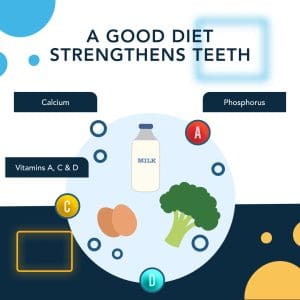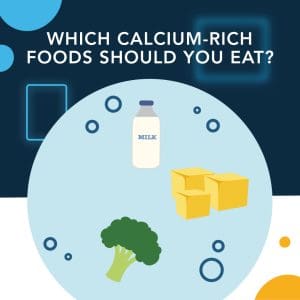Good oral health goes beyond brushing twice a day and flossing regularly. What you choose to eat and drink can have a significant impact on your teeth, influencing everything from tooth decay to gum disease and even bad breath.
Whether you’re looking to prevent cavities, stave off gum disease, or simply maintain a bright and healthy smile, understanding the link between your diet and oral health is a necessary first step. In this article, we will explore the often-overlooked connection between diet and oral health and provide insights into how the foods you consume can either promote a healthy mouth or contribute to dental problems.
The Connection Between Your Diet & Oral Health
It may come as a surprise, but there is a strong link between what you eat and the health of your mouth. It is important to understand this connection to maintain good oral hygiene. By choosing the right foods, such as adding more fruits, vegetables, and dairy products to your diet, you can greatly improve your oral health as well as your overall well-being.
How Can a Good Diet Promote a Healthy Mouth?
Eating a healthy diet is important for maintaining good oral health. Consuming foods that are rich in calcium, phosphorus, and vitamins can help strengthen teeth and gums, promote enamel repair, and reduce the risk of decay. In addition, consuming fibrous fruits and vegetables can stimulate saliva production, which helps to naturally clean the mouth, balance its pH levels, and prevent harmful bacterial growth, thus promoting overall oral hygiene. Embracing these dietary habits can lead to a lifetime of healthy smiles and well-being.
Strengthens Teeth
Maintaining a good diet is essential for strong and healthy teeth. Calcium and phosphorus are the essential nutrients that fortify and strengthen enamel. Foods rich in vitamins A, C, and D contribute to gum health and enamel repair. Including dairy products, leafy greens, and nuts in your daily diet can help you maintain strong and healthy teeth.
Supports Gum Health
Consuming a healthy and balanced diet can significantly improve gum health. Including foods that are rich in vitamin C, such as bell peppers and citrus fruits, can help strengthen gum tissue and reduce inflammation. Also, consuming foods that are high in omega-3 fatty acids, such as flaxseeds and fish, can help prevent periodontal issues by reducing inflammation and maintaining healthy gums.
Promotes Salvia Production
Eating a diet rich in fibrous fruits and vegetables, like apples and carrots, promotes saliva production, which is essential for optimal oral health. Saliva naturally cleanses the mouth, helps neutralize acids, and washes away food particles, reducing the risk of decay. Additionally, staying hydrated by drinking plenty of water enhances saliva flow, further protecting the teeth and gums.
Limits Acid Attacks
A good diet limits acid attacks on teeth by reducing the intake of sugary and acidic foods like sodas, citrus fruits, and candies, which can erode enamel. Incorporating alkaline foods such as green vegetables and dairy can help neutralize oral acidity. Regularly choosing water over acidic beverages also significantly decreases the risk of enamel damage.
Reduces Inflammation
A diet rich in anti-inflammatory foods, such as omega-3 fatty acids found in fish and flaxseeds, helps reduce inflammation in the body, including the gums. Consuming antioxidants from berries, nuts, and green vegetables also supports this anti-inflammatory effect, safeguarding gum health and mitigating the risk of periodontal diseases linked to chronic inflammation.
Nutritional Foods For Healthy Teeth & Gums
Nutritional foods play a vital role in promoting healthy teeth and gums. From calcium-rich dairy products to fibrous fruits and vegetables, we will explore how incorporating these essentials into your diet can enhance oral health and contribute to your overall well-being, as well as specific foods that are rich in each nutrient.
 Calcium-Rich Foods
Calcium-Rich Foods
Consuming calcium-rich foods is essential for maintaining healthy and strong teeth. Dairy products such as milk, cheese, and yogurt are excellent sources of calcium. However, if you prefer non-dairy options, you can turn to almonds, broccoli, and fortified plant-based milk. Regular consumption of these foods helps to reinforce tooth enamel, which helps to prevent decay and ensure a robust dental structure.
Phosphorus Sources
Phosphorus is vital for healthy teeth as it aids in strengthening enamel. Rich sources include poultry, fish, and red meat, which help protect and rebuild tooth structure. For vegetarians, options like lentils, beans, and nuts are an excellent source of phosphorus. Including these in your diet will help ensure your teeth remain strong and resilient.
Vitamin C
Vitamin C is another crucial nutrient for healthy teeth and gums as it strengthens gum tissue and prevents periodontal disease. Citrus fruits, strawberries, kiwi, bell peppers, and broccoli are all rich in vitamin C. Regularly consuming these foods can help maintain gum integrity and enhance your body’s ability to repair oral tissues.
Vitamin D
Vitamin D has a critical role to play in maintaining good oral health by aiding the absorption of calcium, which is essential for strong teeth and healthy gums. You can increase your Vitamin D levels by consuming sources like fatty fish, fortified dairy products, and through exposure to sunlight. Consistent intake of Vitamin D is important for optimal dental health as it helps to prevent tooth decay and gum disease.
Crunchy Fruits & Vegetables
Crunchy fruits and vegetables like apples, carrots, and celery are excellent for teeth and gums. Their fibrous texture acts as a natural toothbrush during chewing, helping to scrub away plaque. These foods also stimulate saliva production, which neutralizes harmful acids, wash away food particles, and promote a healthier oral environment.
Nuts & Seeds
Nuts and seeds are beneficial for oral health due to their high content of essential nutrients like calcium, phosphorus, and omega-3 fatty acids. Almonds, walnuts, and flaxseeds help strengthen tooth enamel and reduce inflammation in the gums. Their crunchy texture also promotes saliva production, which naturally cleanses the mouth.
Omega-3 Fatty Acids
Omega-3 fatty acids, which can be found in fish such as salmon and mackerel, as well as in flaxseeds and chia seeds, are essential for maintaining good oral health. They are effective in reducing inflammation in the body, including the gums, which in turn lowers the risk of developing periodontal diseases.
Antioxidant-Rich Foods
Antioxidant-rich foods, such as berries, nuts, and dark leafy greens, play a key role in oral health. They combat oxidative stress that can harm gum tissue and lead to inflammation. Incorporating these foods into your diet can enhance gum health, promote healing, and protect against periodontal diseases.
Water’s Vital Role in Maintaining Oral Health
Often overlooked, water plays a very important role in maintaining optimal oral health. From rinsing away food particles to hydrating saliva production, this simple yet powerful beverage can keep teeth and gums in top condition.
Neutralizes Acids
Water is an important factor in maintaining good oral health, as it helps to neutralize harmful acids produced by the food we eat. These acids can erode tooth enamel and cause decay and cavities. Drinking water throughout the day, especially after meals, can help to wash away these acids, reducing the risk of acid-related damage to your teeth.
Removes Food Particles
Drinking water is a simple and effective way to clean your mouth. It helps remove food particles and residue that bacteria could otherwise feast on, reducing the risk of plaque buildup. This is particularly important after consuming sticky or sugary foods because water helps maintain a cleaner oral environment and reduces the likelihood of cavities.
Enhances Saliva Production
Water intake is essential for producing saliva, which is necessary for maintaining optimal oral health. Saliva not only moistens the mouth for comfort and digestion, but also helps in repairing early signs of tooth decay, gum disease, and other oral infections. By promoting the flow of saliva, water helps maintain a healthy pH balance in the mouth, thus protecting against bacteria.
Supports Overall Health
Ensuring that you drink enough water is critical for maintaining good overall health, including mouth health. When your body is well-hydrated, it can effectively deliver nutrients to your mouth while removing waste. This is important for the health of your gums and your body’s natural healing processes. Drinking water also helps keep your oral tissues strong and resilient, which makes it easier for them to fight infections and other oral health issues.
Contains Fluoride
In some regions, tap water is enriched with fluoride, a mineral that helps to improve oral health by reinforcing tooth enamel. Drinking water that contains fluoride is an easy and efficient way to combat tooth decay and maintain strong teeth. Consistently consuming water that is rich in fluoride can also provide a consistent benefit to teeth, serving as an ongoing defense against cavities.
Foods That Damage Your Teeth
It’s important to be aware of certain foods that can harm your teeth if consumed frequently. Snacks that are high in sugar, sodas, and acidic fruits like lemons and grapefruit can erode tooth enamel, leading to decay. Sticky foods like dried fruit and candies can stick to teeth for a longer period of time, increasing the risk of cavities. Additionally, hard foods such as ice or popcorn kernels can cause physical damage or even break teeth. To protect your teeth and maintain your oral health, it’s essential to learn to identify and limit these harmful foods.
Sugary Foods & Drinks
Sugary foods and drinks are the primary culprits in tooth decay. Consumables like soda, candy, and pastries feed the bacteria in your mouth, leading to acid production that wears away enamel. Regular consumption can result in cavities and other dental issues, making moderation and thorough dental hygiene essential after indulging in these sweet treats.
Acidic Foods & Beverages
Acidic foods and beverages, such as citrus fruits, tomatoes, and wine, can erode tooth enamel, making teeth more vulnerable to decay. The acidity can soften tooth surfaces, leading to increased wear over time. Rinsing with water after consuming acidic foods or drinks can help mitigate their harmful effects on tooth enamel.
Sticky & Chewy Foods
Sticky and chewy foods such as caramel, dried fruits, and chewing gum tend to stick to our teeth for extended periods, providing a breeding ground for oral bacteria that produce harmful acids. This continuous exposure may speed up tooth decay, particularly in the crevices and gaps between teeth that are difficult to clean with regular brushing.
Starchy Foods
Starchy foods such as bread, chips, and pasta can be problematic for oral health. These carbohydrates break down into simple sugars in the mouth, providing food for bacteria that produce decay-causing acids. Starches can also stick to the teeth and linger in the mouth, further contributing to cavity formation.
Hard Candies
Hard candies are harmful to dental health due to their prolonged presence in the mouth. They dissolve slowly, continuously coating the teeth in sugar. Hard candies can also pose a physical threat by leading to chipped or broken teeth when biting down on them.
Alcoholic Beverages
Alcoholic beverages can dry out the mouth, reducing saliva production, which is essential for neutralizing acids and washing away food particles. Frequent consumption can lead to an increased risk of tooth decay and gum disease. Additionally, many alcoholic drinks contain sugars and acids that further contribute to enamel erosion and dental damage.
Coffee & Tea
Coffee and tea, especially when consumed with added sugars, can stain teeth and affect dental health. These beverages are often acidic and can lead to enamel erosion over time. Frequent consumption can also dry out the mouth, reducing saliva flow necessary for washing away food particles and neutralizing acids, thus increasing the risk of tooth decay.
Negative Effects of a Bad Diet on Your Teeth
Consuming a diet rich in sugars, acids, and starchy foods can seriously harm your dental health. These culprits can cause decay, erosion of enamel, and gum disease, leading to a variety of oral health issues. Understanding the impact of these dietary choices is critical in taking proactive steps to protect your teeth and gums and maintain a bright and healthy smile for years to come.
Sugar & Acid Production
Eating or drinking foods high in sugars and simple carbohydrates leads to increased sugar and acid production in the mouth. These acids attack tooth enamel, initiating the decay process. Frequent snacking on sugary items also prolongs acid exposure, accelerating enamel breakdown and increasing the risk of cavities.
Impact on Saliva Production
A poor diet can impair saliva production, which is essential for neutralizing acids and washing away food particles. Foods high in salt and alcohol also decrease saliva flow and lead to a dry mouth. This reduction in saliva not only makes the mouth uncomfortable but also heightens the risk of tooth decay and oral infections.
Oral Bacteria
Eating foods high in sugar and starch can nourish harmful bacteria in our mouths. These bacteria produce acids that can damage our teeth and cause inflammation in our gums. If the bacterial growth is left unchecked, it can lead to the formation of plaque, which can harden into tartar and worsen gum disease.
Specific Deficiencies & Oral Symptoms
Nutritional deficiencies caused by a poor diet can manifest in various oral symptoms. Lack of vitamin C can lead to gum bleeding and scurvy, while a deficiency in calcium and vitamin D can result in weakened tooth enamel and increased susceptibility to decay. These deficiencies impair the mouth’s ability to fight infections and maintain healthy tissues.
Gum Disease
Poor nutrition can contribute to gum disease by weakening the body’s immune system and its ability to fight infection. A diet low in essential nutrients makes gums more susceptible to infections, which can lead to gingivitis and, if untreated, progress to more severe periodontitis, resulting in tooth loss and other serious health complications.
Enamel Erosion
Acidic foods and drinks like soda, citrus fruits, and sports drinks can cause significant enamel erosion. This loss of enamel, the hard outer layer of teeth, leaves them more vulnerable to decay and sensitivity. Over time, chronic exposure to acids from a poor diet can permanently damage tooth structure, affecting dental health and appearance.
Schedule a Dental Checkup with a Dentist in Davie, FL
To keep your smile bright and healthy, it’s important to schedule regular dental checkups with our expert team in Davie, FL. If you’re located in Broward County, our local dentists can provide personalized advice and treatment plans tailored to your dietary habits and dental needs. Regular checkups help maintain optimal oral health and catch potential issues early, ensuring a healthy smile for years to come. Call our office to schedule your next appointment with a dentist in Davie, FL.
October 14, 2024

 Adult
Adult




 Calcium-Rich Foods
Calcium-Rich Foods